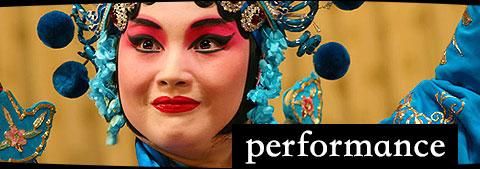The Liyuan Theatre venue hosts a four part Peking Opera repertoire: "Farewell My Concubine, The Crossroads, Bird in Cage & Drunken Beauty". Performed daily from 7:30PM to 8:40PM.
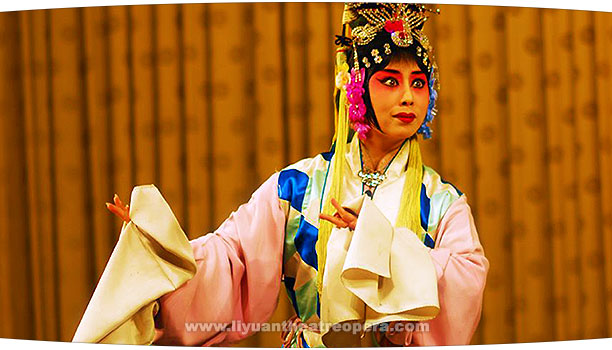
Introduction
With more than a 10 year old history, more than 4000 performances and an audience of millions the show has evolved into a unique showcase for the Beijing opera scene. The play is based on styles of kung fu, monkey and dancing. Resulting in an entertaining and exiting performance as the story unfolds. Catering both Chinese and foreign visitors, the provided english subtitles will help even the inexperienced join in and become engaged with the spirit of Beijing Opera.
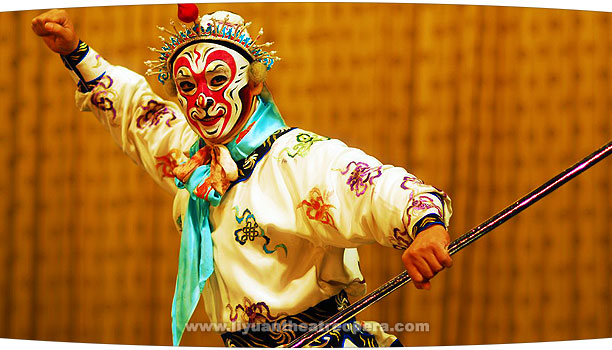
Opera Masks
The actors use opera masks which play an important part in the performance. They are used to identify characteristics of the role such as temper, personality and age. The mask usually consists of a butterfly or swallow painted using the eyes, forehead and cheeks together with enhanced mouth and nose features.
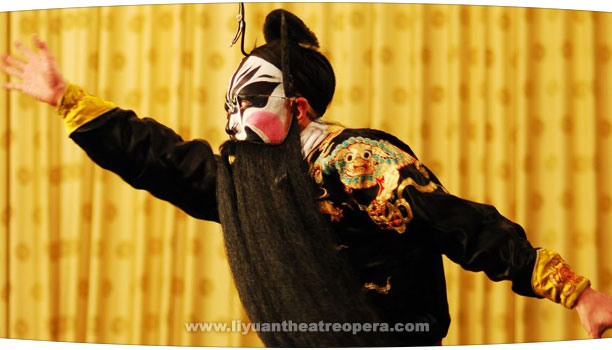
Color Symbols
The colors of the mask further symbolize different characteristics. Once used to the color themes, one can easily see for example who is honest and cunning or a good and a bad person. So it's a good idea to memorize the colors and their meanings before attending the show. Here are the nine color themes used in Peking Opera:
Black meaning direct
White meaning cunning
Blue meaning brave
Yellow meaning vicious
Green meaning strong
Pink meaning weak
Gold/Silver meaning holy
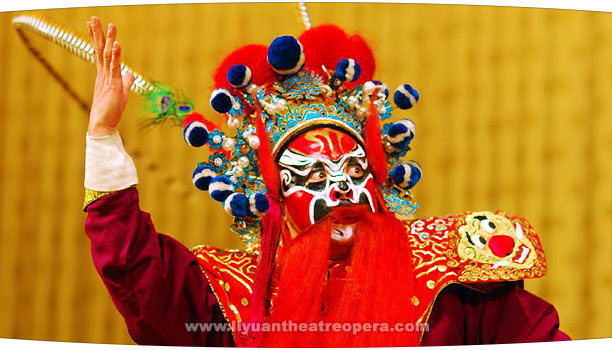
Repertoires
The Four Repertoires selected by Liyuan Theatre for the show are all classics and historically important. Here is the story behind them explained in brief.
Repertoire 1: Farewell My Concubine
This is a tragic but romantic story from 2000 years ago of the battle between king Chu and Han. The king of Han was tricked by the king of Chu. He had his soldiers surround Han's castle and sing their song to make him believe that his army had been defeated and that he was surrounded by his enemy. In his desperation he called his concubine to drink with him as he was certain of his failure. She wanted to please him by dancing the sword dance however she did not want to become a burden in war and committed suicide with the sword.
Repertoire 2: The Crossroads
One of the most classic kung fu style repertoires with no dialog or singing. This story happened during the Chinese song dynasty. Jiao Zan was exiled to Shamen Island for the murder of a wicked government official. On his way to the island he stayed at a guest house to where his friend had followed him secretly to protect him. The owner of the hotel misunderstood that he intended to kill Jiao Zan. Thus they fought in the dark until Jiao Zan appears in time to clear the misunderstanding.
Repertoire 3: A Bird in a Cage
It tells a story of a reunion between a son and his mom separated during war. The Yang family from the North Song Kingdom had their son caught by the Liao Kingdom who later married their princess. 15 years later there was another battle between Song and Liao. This time his younger brother went to fight to the Flying Tiger Valley which was nearby the Liao Kingdom. Because of the lack of food supplies, his mother was sent to help the war. When he heard about this, he really wanted to meet her which was not easy. However his understanding wife helped him to steal a military pass to leave the kingdom in search of his mother.
Repertoire 4: Drunken Beauty
One of the most classic repertoires from the Meilanfang branch of opera. The story happened in the richest of dynasties, the Tang Dynasty. The emperor had asked concubine Yang to prepare a private garden banquette for the emperor. When Yang had finished her preparations she began to wait but there was no sign of the emperors coming. An eunuch arrived and informed her that the emperor will be spending the night with another woman and was unable to come. She felt disappointed, lonely and hateful to which her solution was to start drinking wine by herself until she becomes very drunk. The play becomes a reflection of her beauty through her drunk behavior.



